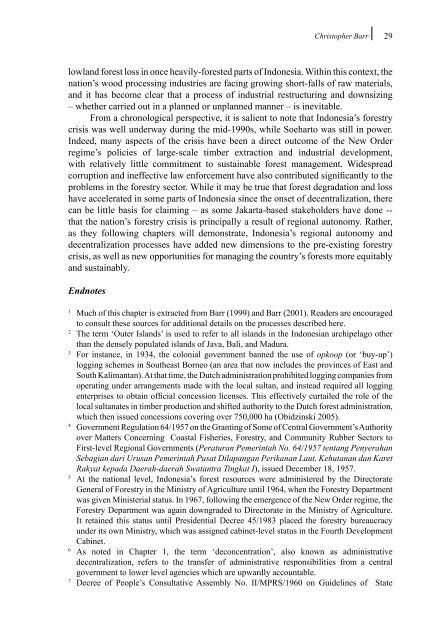Decentralization of Forest Administration in Indonesia, Implications ...
Decentralization of Forest Administration in Indonesia, Implications ...
Decentralization of Forest Administration in Indonesia, Implications ...
Create successful ePaper yourself
Turn your PDF publications into a flip-book with our unique Google optimized e-Paper software.
Christopher Barr 29<br />
lowland forest loss <strong>in</strong> once heavily-forested parts <strong>of</strong> <strong>Indonesia</strong>. With<strong>in</strong> this context, the<br />
nation’s wood process<strong>in</strong>g <strong>in</strong>dustries are fac<strong>in</strong>g grow<strong>in</strong>g short-falls <strong>of</strong> raw materials,<br />
and it has become clear that a process <strong>of</strong> <strong>in</strong>dustrial restructur<strong>in</strong>g and downsiz<strong>in</strong>g<br />
– whether carried out <strong>in</strong> a planned or unplanned manner – is <strong>in</strong>evitable.<br />
From a chronological perspective, it is salient to note that <strong>Indonesia</strong>’s forestry<br />
crisis was well underway dur<strong>in</strong>g the mid-1990s, while Soeharto was still <strong>in</strong> power.<br />
Indeed, many aspects <strong>of</strong> the crisis have been a direct outcome <strong>of</strong> the New Order<br />
regime’s policies <strong>of</strong> large-scale timber extraction and <strong>in</strong>dustrial development,<br />
with relatively little commitment to susta<strong>in</strong>able forest management. Widespread<br />
corruption and <strong>in</strong>effective law enforcement have also contributed significantly to the<br />
problems <strong>in</strong> the forestry sector. While it may be true that forest degradation and loss<br />
have accelerated <strong>in</strong> some parts <strong>of</strong> <strong>Indonesia</strong> s<strong>in</strong>ce the onset <strong>of</strong> decentralization, there<br />
can be little basis for claim<strong>in</strong>g – as some Jakarta-based stakeholders have done --<br />
that the nation’s forestry crisis is pr<strong>in</strong>cipally a result <strong>of</strong> regional autonomy. Rather,<br />
as they follow<strong>in</strong>g chapters will demonstrate, <strong>Indonesia</strong>’s regional autonomy and<br />
decentralization processes have added new dimensions to the pre-exist<strong>in</strong>g forestry<br />
crisis, as well as new opportunities for manag<strong>in</strong>g the country’s forests more equitably<br />
and susta<strong>in</strong>ably.<br />
Endnotes<br />
1<br />
Much <strong>of</strong> this chapter is extracted from Barr (1999) and Barr (2001). Readers are encouraged<br />
to consult these sources for additional details on the processes described here.<br />
2<br />
The term ‘Outer Islands’ is used to refer to all islands <strong>in</strong> the <strong>Indonesia</strong>n archipelago other<br />
than the densely populated islands <strong>of</strong> Java, Bali, and Madura.<br />
3<br />
For <strong>in</strong>stance, <strong>in</strong> 1934, the colonial government banned the use <strong>of</strong> opkoop (or ‘buy-up’)<br />
logg<strong>in</strong>g schemes <strong>in</strong> Southeast Borneo (an area that now <strong>in</strong>cludes the prov<strong>in</strong>ces <strong>of</strong> East and<br />
South Kalimantan). At that time, the Dutch adm<strong>in</strong>istration prohibited logg<strong>in</strong>g companies from<br />
operat<strong>in</strong>g under arrangements made with the local sultan, and <strong>in</strong>stead required all logg<strong>in</strong>g<br />
enterprises to obta<strong>in</strong> <strong>of</strong>ficial concession licenses. This effectively curtailed the role <strong>of</strong> the<br />
local sultanates <strong>in</strong> timber production and shifted authority to the Dutch forest adm<strong>in</strong>istration,<br />
which then issued concessions cover<strong>in</strong>g over 750,000 ha (Obidz<strong>in</strong>ski 2005).<br />
4<br />
Government Regulation 64/1957 on the Grant<strong>in</strong>g <strong>of</strong> Some <strong>of</strong> Central Government’s Authority<br />
over Matters Concern<strong>in</strong>g Coastal Fisheries, <strong>Forest</strong>ry, and Community Rubber Sectors to<br />
First-level Regional Governments (Peraturan Pemer<strong>in</strong>tah No. 64/1957 tentang Penyerahan<br />
Sebagian dari Urusan Pemer<strong>in</strong>tah Pusat Dilapangan Perikanan Laut, Kehutanan dan Karet<br />
Rakyat kepada Daerah-daerah Swatantra T<strong>in</strong>gkat I), issued December 18, 1957.<br />
5<br />
At the national level, <strong>Indonesia</strong>’s forest resources were adm<strong>in</strong>istered by the Directorate<br />
General <strong>of</strong> <strong>Forest</strong>ry <strong>in</strong> the M<strong>in</strong>istry <strong>of</strong> Agriculture until 1964, when the <strong>Forest</strong>ry Department<br />
was given M<strong>in</strong>isterial status. In 1967, follow<strong>in</strong>g the emergence <strong>of</strong> the New Order regime, the<br />
<strong>Forest</strong>ry Department was aga<strong>in</strong> downgraded to Directorate <strong>in</strong> the M<strong>in</strong>istry <strong>of</strong> Agriculture.<br />
It reta<strong>in</strong>ed this status until Presidential Decree 45/1983 placed the forestry bureaucracy<br />
under its own M<strong>in</strong>istry, which was assigned cab<strong>in</strong>et-level status <strong>in</strong> the Fourth Development<br />
Cab<strong>in</strong>et.<br />
6<br />
As noted <strong>in</strong> Chapter 1, the term ‘deconcentration’, also known as adm<strong>in</strong>istrative<br />
decentralization, refers to the transfer <strong>of</strong> adm<strong>in</strong>istrative responsibilities from a central<br />
government to lower level agencies which are upwardly accountable.<br />
7<br />
Decree <strong>of</strong> People’s Consultative Assembly No. II/MPRS/1960 on Guidel<strong>in</strong>es <strong>of</strong> State

















